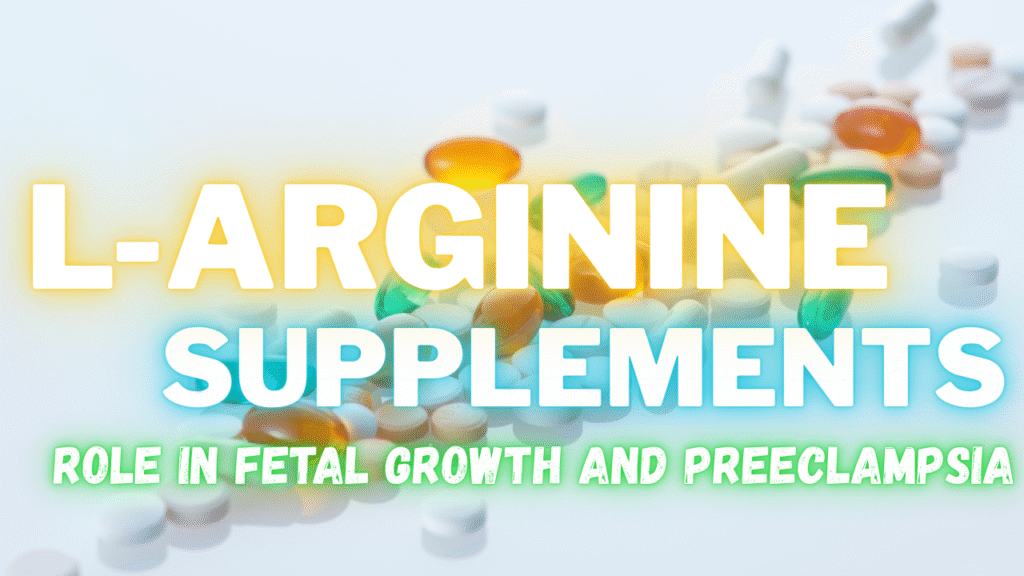
A number of pharmaceutical industries are coming up with L-arginine containing sachets and tablets, claiming that they are effective in the prevention of preeclampsia as well as in improving fetal growth by inhibiting IUGR. So, this arises some questions like:
- What is L-arginine? and how is it effective in preventing preeclampsia?
- What does our researches say about the role of L-arginine in preeclampsia and intrauterine growth restriction?
- Can we use L-arginine for the treatment of preeclampsia ?
So, let’s begin the uncovering of all the aspects of L-arginine to get the answers of our questions.
Table of Content:
- What is L-arginine? and what does “L” signifies?
- Indications and relative effectiveness of L-arginine
- Interactions of L-arginine with other medicines & Supplements
- Dosages for approved indications
- Dietary sources of L-arginine
- Preventive effect of L-arginine on Intrauterine Growth Restriction (IUGR)
- Preventive Effect of L-arginine on Development of Pre-eclampsia
- Unresolved Questions on L-Arginine Supplementation Strategy
- Key Takeaways
- References
L-arginine:
L-arginine is an amino acid that helps your body produce proteins. Proteins are crucial because every cell in our body contains proteins.
L-arginine can be taken from the high protein diet including meat and nuts, as well as from the L-arginine supplements available in oral and IV form, administer upon doctor’s recommendation.
Do you know what does the letter “L” signifies in L-arginine?
The letter L in “L-arginine stands for “levorotatory,” which is a chemistry term that means the amino acid didn’t bond with a protein molecule (free form). The L designates that it easily absorbs into your body because it’s most similar to amino acids already in your body.
Arginine is a precursor in numerous biological pathways including protein synthesis and the production of ornithine and urea, glutamate, NO, creatine, proline, and polyamines. Thus, plays crucial role in the all the body functions associated with these biomolecules.
Indications and Effectiveness of L-arginine:
L-arginine has been used for the variety of the purposes like it is used in combination with ibuprofen for the treatment of migraine,
with conventional chemotherapy drugs for treating breast cancer, used alongside other amino acids for the management of wight loss in patients with AIDs, used to hasten wound healing and to shorten the recovery time after surgery and many
other purposes. But the level of effectiveness of each treatment is different.
So, it’s been classified based on the effectiveness into 3 categories which are mentioned as follow:
Level | Condition | Current Evidence Status | Key Point |
Insufficient evidence of efficacy | Decreased mental function in elderly (senile dementia) | No convincing RCT evidence | Not recommended; no reliable benefit shown |
Prevention of common cold | No human RCT proof | No evidence to support use | |
Female sexual problems | Very limited low-quality studies | No clear clinical benefit | |
Breast cancer as chemo adjuvant | Conflicting, outdated; some cancers use arginine-deprivation | Not standard of care | |
Wound healing (oral L-arginine alone for simple wounds) | Minimal evidence | Benefit mostly from multi-nutrient formulas, not single ingredient | |
B – Some Evidence (Context/ Formulation Dependent) | Migraine headache (ibuprofen-arginate formulation) | Faster pain relief vs standard ibuprofen | Benefit due to faster absorption from arginine salt, not free L-arginine tablets |
High blood pressure | Small BP reductions (2–5 mmHg) | Effect modest; not a replacement for standard antihypertensives | |
Diabetic foot ulcer – prevention/topical/immunonutrition | Improved circulation & healing metrics in prevention; poor support for injection in established ulcers | Best as part of multimodal or nutrition-based approach | |
Male infertility | Improved sperm count/motility in some studies | Effect on pregnancy/live-birth not proven | |
Wound healing / surgical outcomes (immunonutrition) | Fewer infections, shorter hospital stay in some surgeries | Benefit tied to multi-nutrient formulas, not arginine alone | |
Immune support in head & neck cancer (perioperative) | Fewer infections post-surgery | Context-specific, perioperative nutrition only | |
C – Stronger / Clearer Evidence (Specific Context) | Sickle cell disease – IV L-arginine in vaso-occlusive episodes | Reduced pain/opioid use in children/adolescents | Most robust evidence among listed uses; IV hospital use |
Athletic performance | Small improvements in certain aerobic/anaerobic measures | Benefit depends on dose/timing; not universal |




Interaction of L-arginine with other Medicines:
Main interactions of l-arginine with other medicines and supplements as mentioned in the following table:
|
Severity |
Interaction Type |
Interaction Description |
Examples |
Potential Outcome |
|
Major – Avoid Combination |
Antihypertensive drugs (blood pressure–lowering) |
L-arginine can lower blood pressure. When combined with blood pressure–reducing medications, it may cause an excessive drop in blood pressure. |
Amlodipine, Losartan, Captopril |
Risk of hypotension, dizziness, fainting, or shock in severe cases. |
|
Major – Avoid Combination |
Nitrates (increase blood flow to the heart) |
Both L-arginine and nitrate medications dilate blood vessels, which can lead to excessive vasodilation. |
Nitro-glycerine, Isosorbide dinitrate, Isosorbide mononitrate |
Risk of dizziness, light-headedness, and fainting. |
|
Moderate – Use with Caution |
Sildenafil and similar agents |
L-arginine can enhance blood pressure–lowering effects of sildenafil, potentially leading to dangerously low blood pressure. |
Sildenafil (Viagra), Tadalafil (Cialis), Vardenafil (Levitra) |
Risk of dizziness, fainting, and other hypotensive effects. |
|
Moderate – Use with Caution |
Xylitol (herbal/supplement) |
L-arginine stimulates glucagon release from the pancreas, raising blood sugar when it’s low. Xylitol may interfere with this effect, reducing L-arginine’s ability to stimulate glucagon release. |
Xylitol (sugar alcohol used in supplements and sweeteners) |
Possible disruption of blood sugar regulation. |
Dosage for approved uses of L-arginine:
- For congestive heart failure: doses range from 6-20 grams per day, as three divided doses.
- For chest pain associated with coronary artery disease (angina pectoris): 3-6 grams three times per day for up to one month.
- For preventing the loss of the effectiveness of nitro-glycerine in relieving pain in people with chest pain due to coronary artery disease (angina pectoris): 700 mg four times daily.
- For organic erectile dysfunction (ED): 5 grams per day.
- Taking lower doses might not be effective.
- For preventing inflammation of the digestive tract in premature infants: 261 mg/kg added to oral feedings daily for the first 28 days of life.
Preventive effect of L-arginine on Intrauterine Growth Restriction (IUGR):
Intrauterine or fetal growth restriction is defined as “the failure of a fetus to reach its predetermined growth potential.” IUGR has been found to be associated with various factors like
- Chronic conditions like hypertension or Preeclampsia, diabetes, heart disease, kidney disease, thyroid dysfunction.
- Infections like (Toxoplasmosis, Rubella, Cytomegalovirus, Syphilis, Herpes Simplex Virus), malnutrition.
- Substance abuse like alcohol, smoking and recreational drugs.
It has been profoundly observed that L-arginine plays a pivotal role in the prevention of intrauterine growth and improving fetal birth weight especially in the women having history of poor pregnancy outcomes:
The proposed mechanisms by which L-arginine improves fetal birth weight and prevent intrauterine growth restriction are as follow:
- Increasing the production of creatine: Essential for the muscle development
- Stimulating the synthesis of skeletal muscle proteins
- Increase the secretion of growth hormone releasing hormone which raises the level of growth hormone in plasma leading to overall improvement of fetal growth.
- L-arginine possesses strong anti-oxidant effect, which reduces the oxidative stress-a major cause of IUGR.
Preventive Effect of L-arginine on Development of Pre-eclampsia:
Preeclampsia, formerly called as “toxemia of pregnancy” is defined as high blood pressure in pregnancy after the gestational age of 20 weeks associated with proteinuria (>300 mg/day or 0.3g/day), weight gain and swelling. In severe cases preeclampsia is associated with multiple organ dysfunctions e.g. Renal, hepatic, neurological, and haematological abnormalities, intrauterine growth restriction (IUGR) and damage to the liver and kidneys or fluid to build up in baby’s lungs.
It has been profoundly observed that L-arginine possesses the ability to prevent the development of preeclampsia in the high-risk patients. Though its effectiveness in case of treatment of preeclampsia is still under research but a number of studies have reported the efficacy of L-arginine in the preclusion of preeclampsia.
Mechanism:
L-arginine could offer a defensive role against hypertensive pregnancy disorders, considering preeclampsia’s multifaceted pathogenesis—abnormal immune responses, endothelial dysfunction, and placental issues.
L-arginine may exert broad-ranging effects, such as modulating inflammatory pathways, improving angiogenesis, and enhancing the trophoblast function in the placenta. Experimental studies have also pointed towards the L-arginine’s immunomodulatory roles, like damping pro-inflammatory cytokines and bolstering regulatory T cell functions, which could be pivotal in countering preeclampsia.
Unresolved Questions on L-Arginine Supplementation Strategy:
Although various studies have reported the adopted dosage ranges i.e. 3-6.6g/day and the timing of L-arginine i.e. from 20th week till the end of pregnancy, conclusive data on the safe dosage range are still lacking. Therefore, further research is needed to determine the optimal dosage and timing of L-arginine supplementation in high-risk pregnancies, particularly for preeclampsia prevention. This could involve conducting dose–response studies to identify the most effective dosage for preventing PE while minimizing potential side effects. Additionally, investigating the timing of supplementation initiation during pregnancy and its impact on outcomes could provide valuable insights into the therapeutic window of L-arginine supplementation
Key Takeaways:
- L-arginine is an amino acid, which plays a number of roles in body particularly producing nitric oxide and consequently causing vasodilation of the blood vessel. The vasodilation improves the blood flow to the overall body including placenta during the pregnancy
- As per researches, L-arginine plays significant role in the prevention and preeclampsia and IUGR.
- As per researches, the role of L-arginine is only limited to the prevention of preeclampsia rather than the treatment.
Reference:
Weckman, A. M., McDonald, C. R., Baxter, J. B., Fawzi, W. W., Conroy, A. L., & Kain, K. C. (2019). Perspective: L-arginine and L-citrulline supplementation in pregnancy: A potential strategy to improve birth outcomes in low-resource settings. Advances in Nutrition, 10(5), 765–777. https://doi.org/10.1093/advances/nmz015
Cleveland Clinic. (n.d.). L-arginine: Benefits, uses & side effects. In Cleveland Clinic Health Library. Retrieved August 10, 2025, from https://my.clevelandclinic.org/health/drugs/22536-l-arginine
Khansari, S., Nasrollahi, S., Khazaei, S., & Darabi, R. (2024, April 30). The effect of L-arginine in the prevention of preeclampsia and intrauterine growth of the fetus in primigravid women: A randomized clinical trial. Biomedical Research and Therapy, 11(4), 6357–6362. https://doi.org/10.15419/bmrat.v11i4.882
Makama, M., McDougall, A. R. A., Cao, J., Mills, K., Nguyen, P.-Y., Hastie, R., Ammerdorffer, A., Gülmezoglu, A. M., & Vogel, J. P. (2025). L-arginine and L-citrulline for prevention and treatment of pre-eclampsia: A systematic review and meta-analysis. BJOG: An International Journal of Obstetrics and Gynaecology, 132(6), 698–708. https://doi.org/10.1111/1471-0528.18070
Naderipour, F., Keshavarzi, F., Mirfakhraee, H., Dini, P., Jamshidnezhad, N., Abolghasem, N., Foroogh, S., & Shariatinia, F. (2024, October–December). Efficacy of L-arginine for preventing preeclampsia and improving maternal and neonatal outcomes in high-risk pregnancies: A systematic review and meta-analysis. International Journal of Fertility & Sterility, 18(4), 323–328. https://doi.org/10.22074/ijfs.2024.2016433.1580
National Library of Medicine. (2013, December 12). L-arginine: MedlinePlus supplements (Print version) [PDF]. MedlinePlus; reproduced at e-lactancia. Retrieved August 11, 2025, from https://www.e-lactancia.org/media/papers/Arginine2012.pdf
Disclaimer:
This article is for informational and educational purposes only. It does not substitute for professional medical advice, diagnosis, or treatment. Always consult a qualified healthcare provider before starting any medication.













